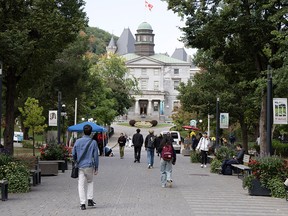Foreign student permits are already outpacing 2023’s record numbers
[Last year, as Canadians focused on the impossibly high cost of housing — ownership and rental — even mainline commentators started to suggest that there was a connection to the invasion-level immigration numbers as Justin Trudeau ferociously pursues his policy of replacing Canada’s European founding/settler people. Reluctantly, the Liberal government and Immigration Marc Miller promised to slightly reduce the numbers of foreign students. Empty promise! Another Liberal lie. Numbers this year are up yet again. It must be remembered that every foreign student needs accommodation — either rental or, less frequently, the purchase of a home, thus raising prices even higher. Oh, yes, despite promises of more new housing starts, in fact, housing starts are down from last year. A housing crisis. It’s immigration, stupid. — Paul Fromm]
IRCC numbers say Canada handed out 216,620 international study permits in the first five months of 2024
Author of the article:
Published Jul 22, 2024 • Last updated 2 days ago • 4 minute read
666 Comments

Even as federal Liberal government is pledging to cap the number of international study permits, its own data show Canada is approving permits at a pace faster than last year, which saw a record number of approvals.
According to numbers curated online by Immigration, Refugees and Citizenship Canada (IRCC), Canada handed out 216,620 international study permits in the first five months of 2024.
Just 200,205 study permits were handed out during the same time period in 2023.
By the end of 2023, 682,420 study permits had been granted to foreign students.
Canada has been granting the vast majority of permits to India, with 278,335 going to students from that country in 2023, a number nearly five times more than to students from China, the second-highest country of origin, who were granted 58,230 permits in 2023.
Canada’s third-most popular source of international students in 2023 was Nigeria, with 37,575 permits handed out in 2023, followed by the Philippines with 33,830, and Nepal at 15,920.
During the first five months of 2024, Indian students were granted 91,510 permits, more than the 85,805 granted over the same period last year.
Chinese students received 21,240 permits in the first five months of this year, compared to 15,565 granted between January and May 2023.
Nigerians received 12,450 study permits by May 2024, up from 8,150 by May 2023.
For the Philippines, 10,140 permits were granted so far in 2024, up from 9,300 over the same period of time last year.
Applicants from Nepal received 4,655 study permits so far this year, compared to 3,575 between last January and May.
In January, Immigration Marc Miller announced he was putting an intake cap on international student permit applications that he expected to result in approximately 360,000 approved study permits, a decrease of 35 per cent from 2023.
The federal government has been under pressure over rising numbers of temporary residents amid a housing shortage and ongoing affordability crisis. In 2023, Canada let in a record 800,000 additional non-permanent residents, such as temporary workers and foreign students, bringing to 2.6 million the number of non-permanent residents in the country as of Jan. 1, 2024, Statistics Canada reported.
The issue came to a head last summer after reports of international students, unable to secure housing, were living rough on the streets and in homeless shelters — including a Conestoga College student from India found sleeping under a bridge in east-end Toronto.
International students were identified as a particular strain on housing and rent affordability in cities across Canada — especially in Ontario, the destination of choice for most foreign scholars.
One food bank in Brampton announced late last year that it was so overrun with international students seeking food, it was no longer allowing them access to their services.
In a statement earlier this year, Miller said the national cap is based on the number of permits expiring in 2024.
Taking into consideration the 20 per cent of students who apply for extensions, Miller put 2024’s target at 606,000 study permit applications, and 364,000 approvals.
“Given the changes to the international student program have not yet seen the traditionally busiest season for study permit processing — summer and early fall — it may be too early to fully assess the data and analyze the impacts, including the intake cap on study permit applications,” IRCC spokesperson Rémi Larivière told the National Post.
Larivière said many factors influence how many new international students will arrive in Canada this fall, including provinces not using their full allocations, changes in approval rates and in-year adjustments.
“As education is a provincial and territorial responsibility, IRCC consulted governments at the provincial and territorial level frequently as the allocations were established,” Larivière said.
“IRCC distributed the adjusted number of study permit applications based on the population share, 2023 volumes and approval rates of each province and territory.”
Conservative immigration critic Tom Kmiec blamed the last nine years of the Trudeau government for the problem of too many temporary residents for the system to handle.
“It is so bad that the current Liberal immigration minister himself said the broken system is ‘out of control’. The previous immigration minister admitted that the system is a ‘complete mess’. Even Trudeau acknowledged their shared failure, calling the system ‘broken,’” he said.
“The Liberal government first allowed corrupt consultants and phoney educational institutions to bring students here under false pretences. Then they promised to fix the mess and bring it under control only to see things become worse amid a growing housing crisis of their making.”
